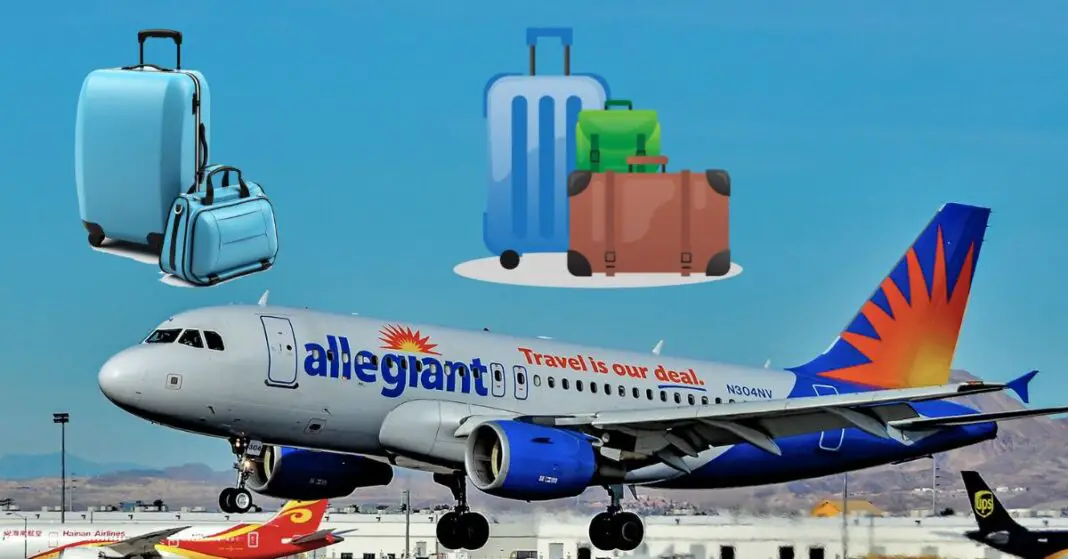As air travel becomes increasingly more accessible and globalized, understanding the unique baggage policies of each airline has become an integral part of the travel planning process.
Especially important is our focus for today, Allegiant Air, a major player in the tourism-driven travel industry.
The company’s baggage policy is unique, featuring principles concerning the number, size, and weight of baggage, as well as the fees associated.
Table of Contents
Understanding the Basics of Allegiant Baggage Policy
Understanding Allegiant’s baggage policy is critical, not just for seamless travels but also to ensure one is making the most economical choice. It’s a common business model across the airline industry that one’s total travel cost goes beyond the ticket price. Baggage fees, be it for carry-on or check-in, forms a significant part of these added costs.
Allegiant Airlines makes no exception. Allegiant’s policy is quite specific: it not only charges for carried and checked luggage but each passenger must also pay different fees for different luggage sizes.
Allegiant’s policy also specifies the charges for bags according to when you pay for them: at the time of booking, before departure, at the airport, or the gate. A well-planned traveler who pays for baggage when booking their trip can save up to 50% off what would be charged at the airport.
Understanding how to navigate baggage policies, like Allegiant’s, can not only make for more efficient travels but can also be a great way to care for your budget. Just as one would go the extra mile to innovate in business, it is equally important to be savvy with these smaller, but impactful, financial decisions. As in any other field, knowledge is power – and saving!
Carry-On Policy
Each Allegiant traveler is entitled to bring one complimentary personal item. Think of it as your in-flight essentials organizer: a purse, clutch, small backpack, laptop bag, or briefcase that neatly fits under the seat in front of you. Its dimensions should not exceed 8 x 14 x 22 inches (20 x 35 x 56 cm).
Additionally, you can include one carry-on bag in your travel ensemble. This reliable wheeled companion, like a roll-aboard or garment bag, can provide you with extra packing space. However, keep in mind that it must fit snugly in the overhead compartment, adhering to the 10 x 16 x 22 inches (25 x 40 x 56 cm) size limit.
Remember: Both your personal item and the carry-on bag must comply with the weight restriction of 40 pounds (18 kg). Going beyond this limit may result in additional fees, transforming your budget-friendly trip into a more expensive adventure.
Pro Tip: Avoid last-minute surprises and potential fees by investing in a portable luggage scale to weigh your bags before check-in.
Checked-in Baggage Policy
Number of bags: Each passenger is allowed to check up to 5 pieces of luggage.
Weight limit: Ensure that each checked bag weighs below 50 pounds (22.7 kg). Going beyond this limit will result in additional fees, starting at $50 for the first 10 pounds overweight, and increasing progressively.
Size limit: The maximum linear dimension for each checked bag is 80 inches (203 cm), calculated by combining the height, width, and depth. Bags exceeding this size will also be subject to additional fees.
Fees: Checked baggage fees vary based on the route and timing of purchase. It is more cost-effective to pre-purchase your checked bags online or during booking, with prices starting at $20 per bag. Adding bags at the airport incurs significantly higher fees, starting at $75 per bag.
Fee Frenzy
Fees are the factor that distinguishes budget-friendly from budget-blown. To prevent unexpected financial surprises, keep these key points in mind:
Pre-purchase your checked baggage: Booking your checked bags online or during the initial booking is much more cost-effective than adding them at the airport. The earlier you purchase, the better the deal!
Weighty concerns: Bags surpassing the 50-pound limit will trigger additional fees that increase progressively with weight. Pack strategically to stay within the limit.
Size matters: Exceeding the 80-linear-inch limit also results in hefty surcharges. Opt for smaller, efficiently packed bags or consider shipping heavier items separately.
Sporting equipment: If you’re bringing golf clubs, skis, or a surfboard, expect additional fees based on the type and number of equipment pieces.
Pro Tip: Manage your baggage allowance and fees effortlessly by downloading Allegiant’s mobile app. You can even purchase additional baggage at your fingertips!
Special Situations
Traveling with a musical instrument, oversized stroller, or wheelchair? No worries! Allegiant accommodates these items free of charge, within specific size and weight restrictions.
Musical Instruments: You are permitted to bring one standard-sized musical instrument (such as a guitar or violin) as checked baggage without charge, provided it adheres to the specified size and weight limits (50 pounds, 80 linear inches). Larger instruments like cellos or double basses may require additional fees or special handling; please contact Allegiant customer service for detailed instructions.
Oversized or Bulky Items: Sports equipment like skis, snowboards, golf clubs, and surfboards can be transported for a fee, with the exact amount contingent on the type and quantity of items. Refer to the Allegiant website for precise fees and size/weight restrictions for each equipment category. Oversized items like wheelchairs, strollers, or car seats are typically accepted at no extra charge, as long as they meet specific size and weight criteria.
Traveling with Pets: Allegiant allows small dogs and cats to accompany you in the cabin under their “Pet Policy,” subject to a fee and specific breed and weight restrictions. For larger pets or emotional support animals, special arrangements may be necessary through Allegiant Cargo.
Medical Equipment: Essential medical equipment, such as wheelchairs, CPAP machines, or oxygen tanks, is generally permitted without charge if it complies with size and weight restrictions. Be prepared to provide documentation from your doctor if requested.
Tips for Special Situations:
- When packing oversized or special items, ensure they are securely packaged and labeled with your contact information.
- Contact Allegiant customer service in advance to verify any specific requirements or fees related to your situation.
- Consider shipping bulky items separately to mitigate high fees or to avoid inconvenience at the airport.
Packing Pointers
Now that you’re equipped with baggage know-how, let’s pack smart! Consider these tips:
Layer like a pro: Pack versatile clothing that can be easily mixed and matched to create multiple outfits. This reduces the need for bulky items and maximizes space.
Utilize packing cubes: These organizational heroes keep your belongings tidy and compressed, freeing up valuable suitcase real estate.
Embrace travel-sized toiletries: Opt for travel-sized versions of your favorite toiletries to save space and money. Consider refillable containers.
Check the weather forecast: Pack according to the destination’s climate to avoid bringing unnecessary clothes and taking up precious space.
Does Allegiant allow a free carry-on?
When you fly with Allegiant, you get a free personal item to keep under your seat. However, a complimentary carry-on isn’t included in basic fares. You’ll need to pay an extra fee for that overhead bin essential. The upside? If you pay these fees when booking your ticket, it’s much cheaper than if you wait and buy them at the gate.
Is a backpack considered a carry-on Allegiant?
Allegiant is cool with backpacks, but it’s all about their size. If you’ve got a smaller one, like a daypack or a laptop bag, just slide it under the front seat, and it becomes your free personal item.
But if your backpack is on the bigger side and wants to chill in the overhead bin, it’s considered a carry-on and needs its fee.
How much is a checked bag on Allegiant?
The price for checking a bag with Allegiant is influenced by two key factors: the timing of your purchase and your specific route. If you choose to pre-purchase, during booking, the cost ranges from $15 to $45 per bag for a one-way trip. If you opt for pre-departure through Manage Travel or Online Check-in, the fees vary between $15 and $70 per bag for a one-way journey.
Alternatively, if you decide to check your bag at the airport, the fee is a flat $50 per bag for the first 5 checked bags on a one-way basis.
What is Allegiant’s baggage fee?
Allegiant’s baggage fees vary depending on when and how you handle them. For carry-on bags, if you pre-book, the fee ranges from $10 to $45. Opting for pre-departure processing incurs a flat fee of $55, while checking in at the airport comes with a fee of $75.
In the case of checked bags, pre-booking fees range from $15 to $45, pre-departure incurs a $50 flat fee, and checking in at the airport results in a fee of $75. It’s essential to consider the timing of your arrangements to make the most cost-effective choice for your baggage needs.





